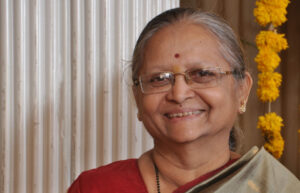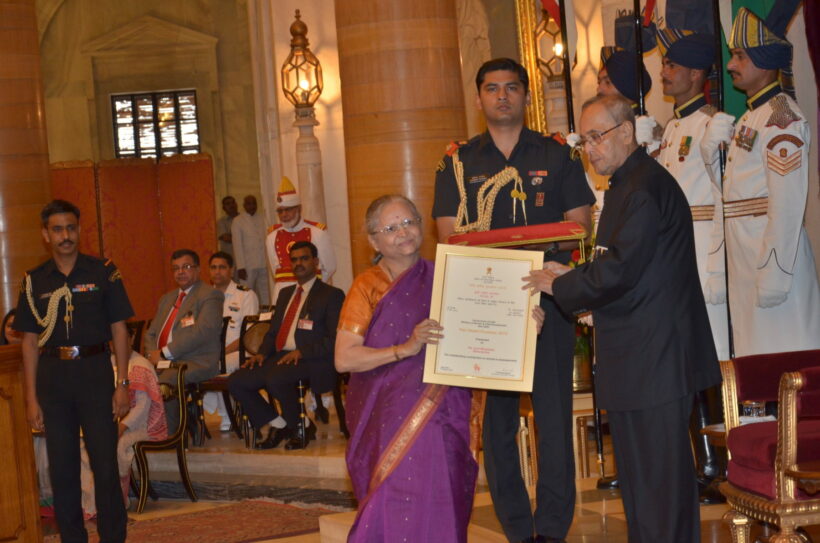Jyoti Mhapsekar: A Life of Service to Marginalized Women
Since 1975, Jyoti Mhapsekar has been working to uplift the lives of marginalized women, empowering them through education, healthcare, and environmental programs.
by Eric Michael Santos

Jyoti Mhapsekar is one apple that didn’t fall far from the tree. Raised by parents who were freedom fighters, she has dedicated more than half her life to her work as a women’s rights activist, environmentalist, and waste management advocate.
“I’m proud to have such courageous and dedicated parents who organized and worked with people,” Jyoti said.
When the United Nations declared 1975 as International Women’s Year as a reminder to the international community that discrimination against women persisted in much of the world, a group of young female activists that included Jyoti took action. They established Stree Mukti Sanghatana or SMS (Women’s Liberation Organization) with the aim of empowering disadvantaged women in India and improving their lives.
Today, SMS is the leading women’s organization in the state of Maharashtra. It works to uplift women’s position in society by creating awareness of women’s issues and issues related to equality, peace, and development through theater, family counseling centers, daycare centers, and adolescent sensitization programs, among others.
A librarian by profession and a renowned playwright, Jyoti is the current president of SMS. She has received many awards for her social activism including the Nari Shakti Puraskar, an annual award given by the Ministry of Women and Child Development of the Government of India to individual women or institutions that work towards the cause of women empowerment. It is the highest civilian honor for women in India, and is presented by the president of India on International Women’s Day (March 8).
Empowering women waste pickers
SMS started work for the Parisar Bhaginis (women waste pickers) of Mumbai in 1998. India is among the highest waste-generating countries in the world. According to a 2018 World Bank report, India produces around 277 million tonnes of waste annually, an output that is likely to reach 388 million tonnes in 2030 and 543 million tonnes by 2050.
There are no official data on the number of waste pickers in India; estimates range from 1.5 million to 5 million. Studies in several Indian cities show that the majority of waste pickers are women.
“Women waste pickers in India lie at the bottom of the waste management pyramid. They are exploited and constantly live below the poverty line,” Jyoti said.
She cited studies that showed that waste picking is a caste- and gender-based activity in India. Ninety percent of all waste pickers are the primary breadwinners for their families. They carry heavy loads and lack transport or storage facilities. Waste pickers suffer serious health problems resulting from unhygienic work conditions. The life of a waste picker is totally insecure, with exploitative middlemen further degrading the marginalized workers’ already pitiful condition. Most waste pickers are caught in the moneylender’s trap (often a middleman himself) and pay loans with exorbitant interest rates.
Stronger together
Through their Parisar Vikas (Neighborhood Development) program, SMS sought to address the problems of women waste pickers and the issue of urban waste management. One of the key Parisar Vikas outputs is the formation in 1999 of Parisar Bhagini Vikas Sangha (PBVS), a federation of 250 self-help groups consisting of 2,500 waste pickers in six cities and Parisar Sakhi Vikas sanstha (PSVS) with 500 members in Navi Mumbai. “This is the most important achievement of SMS,” Jyoti shared.
PBVS and PSVS both have an executive committee of nine members (plus two advisors from SMS) elected through a democratic process. The committee members meet every quarter to discuss ways to address the problems waste picker communities face.
With PBVS registered as a community development society with the Municipal Corporation of Greater Mumbai (MCGM), the municipal authorities provided the federation with tempos and spaces for dry waste sheds in several areas of Mumbai and Thane. PBVS maintains these sheds, collects dry waste through its members, stores it at the sheds, and disposes it when enough material is collected.
Under the guidance of SMS, PBVS and PSVS also monitor internal lending activities of individual self-help groups and their social and financial audit; provide economic assistance to members in need; conduct awareness sessions on life skills, training for leadership skills and alternate skills like composting, bio-methanation, gardening, and fine sorting of dry waste; help women seek employment; conduct health awareness sessions and health camps for members; and promote education for children of members.
SMS also helped PBVS members to register their own Cooperatives in 2004 to sign contracts with housing societies and other establishments for Zero waste projects. Through these cooperatives, waste pickers who used to search waste in streets and waste dumps, amidst touting and harassments by locals and police (waste pickers are not allowed in waste dumps), have been capacitated to collect and manage waste at the source — in apartments and housing societies — making their work easier and giving them a regular day off, predictable source of income, and equally important, dignity of labor.
SMS likewise provide extra study sessions in the evening conducted for the waste pickers’ children, allowing them to cope with their studies. Their special programs for adolescent girls have helped reduce the incidence of child marriages.
SMS also conducts health camps, runs a dispensary opposite the dumping ground and a mobile medical van to visit the communities.
“Unless women waste pickers are united, their problems will not be solved. Together, they can achieve a lot. We need to strengthen women’s organizations not only at the city level but at the state, national and global level,” Jyoti said.
Political will, middle-class support
Many challenges remain for women waste pickers. Weak implementation of waste segregation policies, refusal of local authorities to integrate women waste pickers into the system and the apathy of the urban middle class are among the major hurdles, according to Jyoti. The COVID-19 pandemic only made matters worse. With community lockdowns, the collection of dry waste became almost impossible, resulting in the loss of livelihood for many women waste pickers who survive only on meager daily wages. Moreover, many people have almost stopped segregating waste in their homes during the pandemic.
“Government should make compliance with policies on waste segregation at source compulsory. Robust waste management policies must be fully implemented. People, especially the middle class, should do their part in segregating waste,” urged Jyoti.
Jyoti believes that the youth must be educated about the environment and proper waste management, including waste segregation and Zero Waste solutions. “We must provide cheaper alternatives to incinerators such as biogas,” she said.
Fueled by hope
Faced with so many challenges, what keeps the 73-year-old Jyoti going? “Smiling women, hopeful women. Their positive attitude and eagerness to join us and learn new things give us encouragement to continue the work. If you work with people and share their sorrows and joys, this gives you enough energy to continue.”
According to Jyoti, activists have to be optimistic. “We have to maintain a positive mindset, move forward and ensure that the program continues and more people join and support the work,” she said.
And that optimism, the energy, was perceptible in Jyoti. It’s easy to see that this kind, gentle, and humble woman is one of those persons blessed with a charismatic, genuine smile that can light up a room and inspire people to do good.






